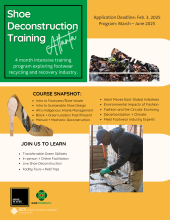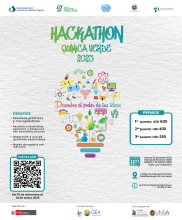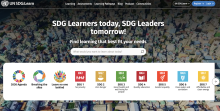Shoe Deconstruction Training Atlanta - Apply by February 3
Shoe Waste Atlanta and Black Sustainability, Inc. are accepting applications for their upcoming Shoe Deconstruction Training program! This four-month intensive program aims to educate and train the next generation of industry leaders on topics including material science, waste recovery, and circular economy.
WHERE: SW Atlanta
COST: $3,500
DURATION: 17 Weeks
SKILL LEVEL: Beginner to intermediate, no experience necessary!


